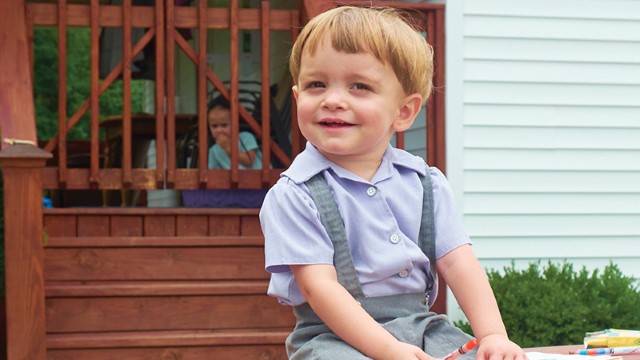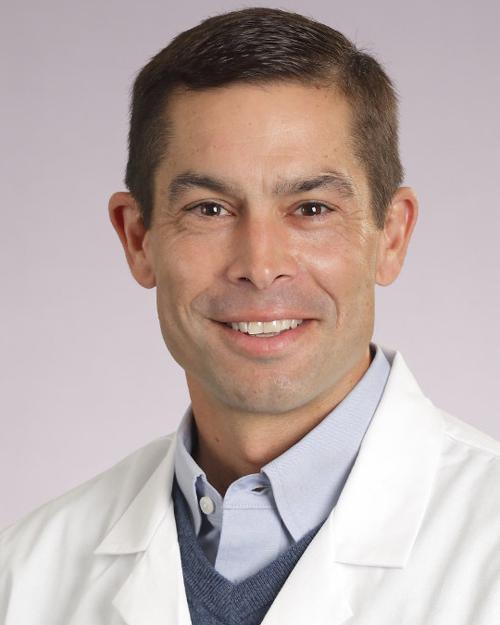
No one watching Ethan Byler play on the swing set with his sister, Emily, would point to the toddler and say, “He had a heart transplant.” They wouldn’t know that Ethan was the first child in get a Berlin Heart. They’d never guess this external Benign chest pain inmechanical pump kept Ethan alive until he got a new heart on children March 31, 2015. One week after his transplant, Ethan was healthy enough Benign murmurs in children to be discharged. After a brief stay at the Ronald McDonald House in Louisville, Ethan and his parents, Andrew and Elizabeth Byler, returned Syncope in children to their Hart County, Kentucky, home on April 14, 2015.
“That’s our wedding anniversary, so we had many reasons to have thankful hearts that day,” Elizabeth Byler said.
Joshua D. Sparks, M.D., pediatric cardiologist and medical director for the Advanced Heart Failure Program with Norton Children’s Heart Center and University of Louisville Physicians, said that without the support of the Berlin Heart, Ethan may not have survived to get his new heart.
“After his heart transplant, he was discharged on day seven from surgery,” Dr. Sparks said. “This was quite remarkable.”
Ethan, now 3, was only 7 months old when he was diagnosed with dilated cardiomyopathy (DCM), a condition in which the heart becomes enlarged and is unable to pump blood efficiently. Although this condition is associated with genetic factors, the direct cause often is not known. Emily, a year older than her brother, also has DCM. She currently is doing well on medications but may eventually need a heart transplant.
Dr. Sparks explained that although cardiomyopathy is relatively rare, it’s the leading reason for heart transplants in children. Since up to 35 percent of DCM cases are inherited, screening is recommended for all first-degree relatives of affected patients.
“Because of Emily’s history, we were able to diagnose Ethan before he had any symptoms,” Dr. Sparks said.
On a Sunday evening, Elizabeth Byler called Dr. Sparks to say Ethan’s skin felt clammy and he looked bad. He wasn’t eating and was breathing very hard and fast. Ethan was admitted to Norton Children’s Hospital, where he was started on intravenous medication and put on the heart transplant list. Ethan also had a respiratory virus. While hospitalized, Ethan’s condition worsened, and he required very high doses of intravenous heart medication and a ventilator. The pediatric cardiology team decided a mechanical heart pump was critical to keep Ethan’s vital organs functioning until a donor heart could be found.
Because of his small size, the Berlin heart was Ethan’s only option. Unlike other pumps, which are implanted internally, the Berlin Heart is an external pump. Erle H. Austin III, M.D., pediatric cardiovascular surgeon with Norton Children’s Heart Center and UofL Physicians – Cardiovascular and Thoracic Surgery, explained to the Bylers that Ethan’s preparation for the Berlin device would require surgery to insert a tube into his heart.
“We were so scared, but he told us, ‘I’d be scared not to do this. It’s what Ethan needs,’” Elizabeth Byler said.
“Compassion is a big part of what we do in providing advanced care for our patients and their families,” said Dr. Austin, who performed Ethan’s heart transplant surgery.
The surgery would require several hours to connect the pump so it could relieve a lot of the work off Ethan’s heart and supply blood flow to his other organs. The first 24 hours after the pump is placed is very critical to make sure bleeding is controlled. Since blood will be moving through the mechanical pump, Ethan’s blood required special medicines to ensure that he did not develop blood clots, which can then go to the brain and cause a stroke. Caring for Ethan from this point required the work of cardiovascular surgeons, intensive care doctors, his heart failure cardiologist, and multiple supporting team members to help care for him. He required constant monitoring.
Ethan’s family, who are progressive Amish, credit their faith and the incredible support of their community, family and medical team for seeing them through this difficult time.
“Every day we heard so many people say, ‘We’re praying for you’ and knew they meant it,” Elizabeth Byler said. “When all we could do was cry, Dr. Sparks would hug us and say, ‘It will be all right.’”
By all accounts, Ethan is far more than “all right” these days. According to his mom, “He just goes, goes, goes!”
Dr. Sparks noted that beyond the need for ongoing medications and regular checkups, young heart transplant patients can lead reasonably active lives.
“Our goal is for them to live a full, normal life and have the opportunity to do whatever they want,” he said. The Bylers feel incredibly blessed to know their children are getting great care while remaining close to home.

